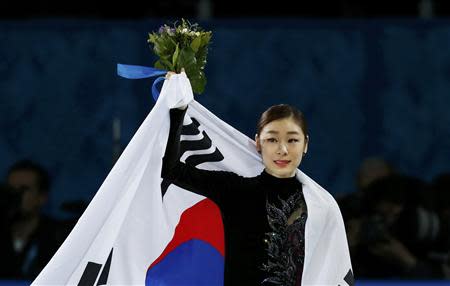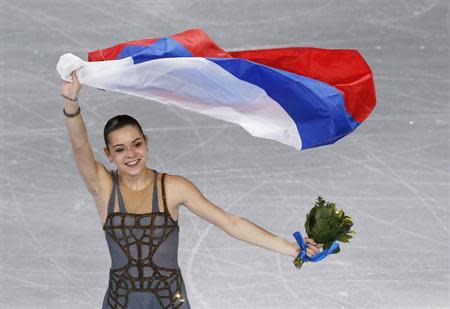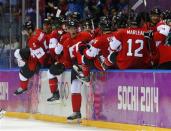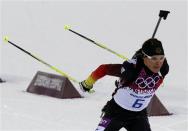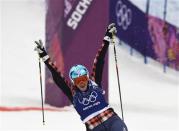Two doping cases hit Games, Canadian men beat U.S. in hockey
By Mike Collett-White SOCHI, Russia (Reuters) - Two athletes tested positive for banned substances on Friday in the Sochi Olympics' first doping cases, but an emotional gold for crisis-torn Ukraine and ice hockey victory for Canada over the United States ensured sporting action had the final say. There will be few more popular winners at Russia's first Winter Games than the women's biathlon relay team from Ukraine, who edged out the hosts at the end of a week when anti-government protests had left at least 77 people dead. A Ukrainian skier had already pulled out of Sochi in protest at President Viktor Yanukovich's handling of the crisis, and other athletes from the team said they struggled to focus as their country went up in flames. "When I was on the podium I couldn't stop crying. I tried to calm down and was trying to hide it behind my skis. They were tears of happiness, not only mine, but of the whole country, our team," team member Valj Semerenko told reporters. "We are so happy that the people of Ukraine are happy back home and that something good happened for our country," added Olga Pidhrushna. Ukraine's only other Winter Olympic gold medal was won by figure skater Oksana Baiul in the women's individual event at the Lillehammer Games in 1994. In the big ice hockey clash, Canada once again prevailed over arch-rivals the United States in their semi-final at the futuristic Bolshoy Ice Dome, denying the Americans revenge for the final of the 2010 Winter Olympics in Vancouver. A single goal was the thin dividing line between the sides in the end. Jamie Benn, charging toward the slot, redirected Jay Bouwmeester's low shot past a helpless Jonathan Quick. In the other semi-final, Sweden beat Finland 2-1, and they meet the Canadians in the final event of the Games on Sunday evening played just hours before the closing ceremony. In the short track speed skating, Russia's Viktor Ahn added two more golds to his impressive tally in the men's 5,000 metres relay and the individual 500 metres events. It takes his Olympic gold medal haul to six, three for South Korea and three for his adopted country Russia. His feat propelled Russia to second in the overall medals table with nine golds, one behind Norway. SKATING SCANDAL The intensity on the field of play was a welcome tonic on a day when two athletes were thrown out of Sochi for doping. German biathlete Evi Sachenbacher-Stehle, a two-times Olympic champion at cross country, tested positive for a banned stimulant and was sent home. The 33-year-old, who also has three Olympic cross country silvers to her name, narrowly missed out on medals in Sochi, coming fourth in both the 12.5km mass start and the mixed relay. "This is the worst nightmare you could imagine," she said. "I can't explain to myself at all how the doping test could be positive." At around the same time, Italian officials announced that bobsleigh athlete William Frullani, a policeman, also tested positive for a banned substance and was excluded from the team. The announcements came as the Olympics were still reeling from a judging scandal in the women's figure skating late on Thursday that threatened to take some of the gloss off the host nation's first-ever gold in the event. Adelina Sotnikova, who few expected to be among the medals before the contest began, beat favourite Kim Yuna late on Thursday, despite the South Korean defending champion producing a performance many viewers deemed superior. The controversy rumbled on into Friday, when South Koreans expressed shock and anger at a decision they said had been engineered to favour the Russians. More than 1.5 million people signed an online petition demanding an inquiry into Kim's loss, which many people stayed up into the early hours to watch. "Queen Yuna" is South Korea's most loved and best-known athlete. It was not only her compatriots who questioned the scoring. "How the hell were Yuna and Sotnikova so close in the components?" exclaimed Canada's four-time world champion Kurt Browning. "I just don't get it. "Yuna Kim outskated her, full stop. I'm shocked. What, suddenly, she just became a better skater overnight? I don't know what happened. I'm still trying to figure it out." Russian television and radio lionised their 17-year-old champion on Friday, and little mention was made of the judging. RUSSIAN RECORD BREAKER In the men's 5,000 metres short track speed skating final, the United States finished second to claim their only medal in either short track or traditional long track speed skating at the Sochi Olympics. In the long track events, their men's and women's team pursuit trios were both knocked out in the first round. The U.S. team had predicted they were capable of winning eight medals prior to the Games, but their efforts may have been hampered by a fiasco over their suits when they decided to change them halfway through the Olympics to no apparent effect. Marielle Thompson and Kelsey Serwa took gold and silver in the rough and tumble of the women's ski cross final held at the Extreme Park. German Anna Woerner was taken off the course on a stretcher with a knee injury after a nasty fall during the quarter-finals, her leg appearing to give way on impact as she hit the icy landing slope. Safety concerns were high after Russian free skier Maria Komissarova fractured a vertebra and dislocated her spine during practice on the same course last week. Canada's men also won the curling, brushing aside Britain to win 9-3 and claim the country's third successive title and complete the double after their women also took gold. The women's Alpine skiers bade farewell to the Games as American Mikaela Shiffrin won the slalom ahead of Austrian duo Marlies Schild and Kathrin Zettel. But arguably the moment of the day came in the women's biathlon. Given upheaval at home, in which Russia played a major role by backing Yanukovich against pro-European protesters, it was an emotional moment as Ukraine's flag was raised. Russian President Vladimir Putin will be desperate for the crisis in neighbouring Ukraine not to overshadow Sochi, which he has used to project his country as a modern, tolerant state that does not deserve the Western criticism it receives. But Russian protest group Pussy Riot, who released a music video in Sochi this week attacking the Games and Putin's human rights record, have drawn international attention to what critics say is his refusal to brook opposition. In Moscow on Friday, a judge convicted eight defendants of assaulting police during a protest against Putin, in what activists called a "show trial". Sentencing was postponed until Monday, however, meaning it will be revealed after Sunday's close of the Olympics. Putin says he does not use courts as a political tool. (Additional reporting by the Reuters Olympics team in Sochi and Rosa Khutor and by Ludmila Danilova and Gabriela Baczynska in Moscow. Editing by Keith Weir)

 Yahoo Sports
Yahoo Sports 


